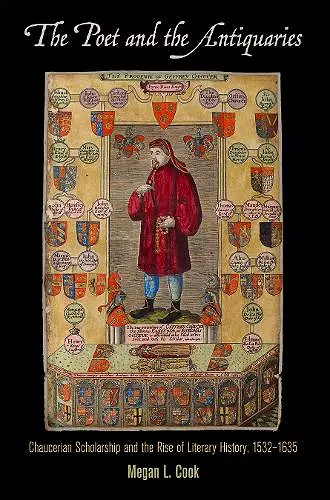The Poet and the Antiquaries
Chaucerian Scholarship and the Rise of Literary History, 1532-1635
Format:Hardback
Publisher:University of Pennsylvania Press
Published:12th Apr '19
Currently unavailable, and unfortunately no date known when it will be back

In The Poet and the Antiquaries, Megan L. Cook explores how early modern historians, lexicographers, religious polemicists, and other readers with extra-literary interests in the English past made Chaucer a figure of lasting cultural significance.
Between 1532 and 1602, the works of Geoffrey Chaucer were published in no less than six folio editions. These were, in fact, the largest books of poetry produced in sixteenth-century England, and they significantly shaped the perceptions of Chaucer that would hold sway for centuries to come. But it is the stories behind these editions that are the focus of Megan L. Cook's interest in The Poet and the Antiquaries. She explores how antiquarians—historians, lexicographers, religious polemicists, and other readers with a professional, but not necessarily literary, interest in the English past—played an indispensable role in making Chaucer a figure of lasting literary and cultural importance.
After establishing the antiquarian involvement in the publication of the folio editions, Cook offers a series of case studies that discuss Chaucer and his works in relation to specific sixteenth-century discourses about the past. She turns to early accounts of Chaucer's biography to show how important they were in constructing the poet as a figure whose life and works could be known, understood, and valued by later readers. She considers the claims made about Chaucer's religious views, especially the assertions that he was a proto-Protestant, and the effects they had on shaping his canon. Looking at early modern views on Chaucerian language, she illustrates how complicated the relations between past and present forms of English were thought to be. Finally, she demonstrates the ways in which antiquarian readers applied knowledge from other areas of scholarship to their reading of Middle English texts.
Linking Chaucer's exceptional standing in the poetic canon with his role as a symbol of linguistic and national identity, The Poet and the Antiquaries demonstrates how and why Chaucer became not only the first English author to become a subject of historical inquiry but also a crucial figure for conceptualizing the medieval in early modern England.
"One of the achievements of [Cook's] book is that it outlines the chronology of the developing Chaucer tradition while managing at the same time to differentiate its various elements with telling reference to printed and manuscript sources . . . Cook's survey of the early centuries of Chaucer reception gives a powerful sense of the ways in which he was co-opted in various conceptualizations of nation, language, faith and history." * The Times Literary Supplement *
"This book has much to recommend it. It offers a lively treatment of the history of Chaucer's folios through the beginning of the seventeenth century, and will be indispensible to those who work with the English reception of medieval works in the Tudor period. It also demonstrates the extensive reach of antiquarian communities in the sixteenth and seventeenth centuries and suggests the existence of networks of textual exchange within England (and even outside of it) that were hitherto unguessed. Any scholar who deals with what Alice S. Miskimin famously called 'the Renaissance Chaucer' should have this book on their shelf." * Modern Philology *
"[A] suggestive and sensitive book. It is also intensely readable in a way that does not compromise its rigor, as each chapter is written with a rare level of intellectual and stylistic fluency . . . Cook's central point [is] that 'Chaucer' is largely a product of specific audiences and their needs. As she demonstrates ably throughout this volume, the lingering idea of 'Chaucerian exceptionalism', and the 'untimeliness or temporal slipperiness' with which he is often credited, are conceptions that have their own histories, being leftover traces of his Tudor and Stuart readerships." * Journal of British Studies *
"Considered in toto, Cook's book attractively illustrates how 'the medieval past is always shaped by its postmedieval interpreters.' She writes in a crisp, clear, and unpretentious style, which is easy to read. Her love of the specific shines through, driving analyses which are meticulous, copiously documented, and clearly structured. What Cook does is done superlatively well. Leaving one's audience asking for more is no bad thing." * Medium Ævum *
"Elegantly written and meticulously documented, The Poet and the Antiquaries offers a genuinely new, original, and exciting intervention into the study of the reception, editorial, and reading history of Geoffrey Chaucer." * Siân Echard, University of British Columbia *
"Megan L. Cook both synthesizes strands of current criticism and moves decisively beyond them. Bringing together book and manuscript history, reception studies, the history of the English language, detailed work on Chaucer as an authorial figure, and a sustained exploration of the developing editorial tradition and broader history of literary and cultural scholarship, she creates a fresh perspective on a very canonical figure's afterlife in a much-studied period." * Lucy Munro, King's College, London *
ISBN: 9780812250824
Dimensions: unknown
Weight: unknown
288 pages